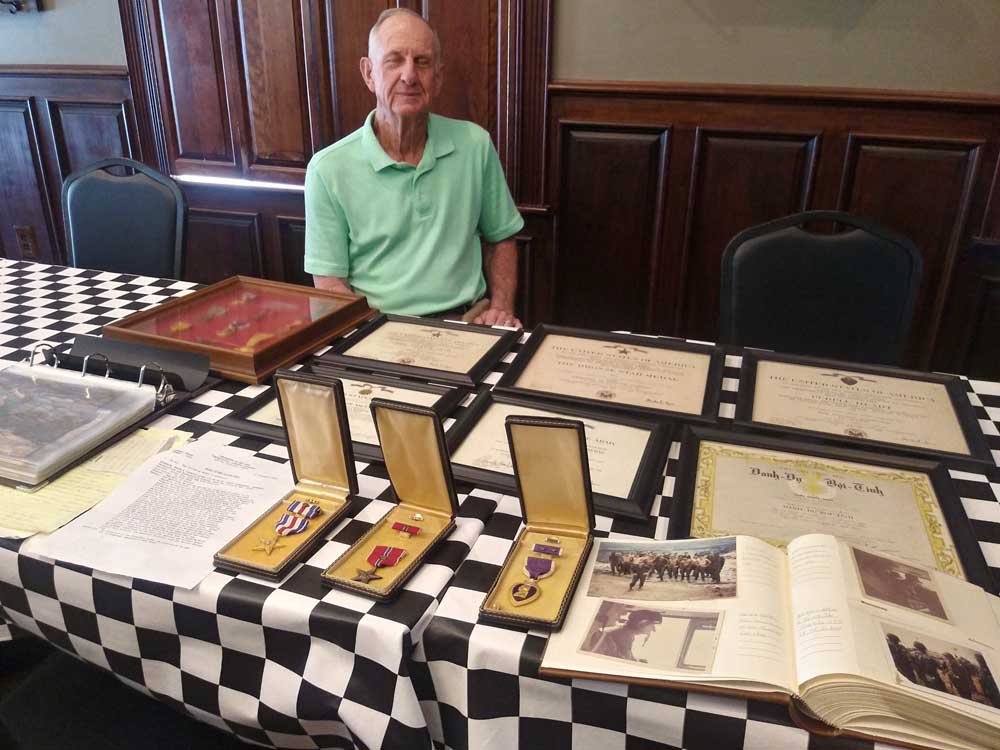‘We can’t forget’: Vietnam veteran Kendrick reflects on Memorial Day
Published 8:00 pm Saturday, May 28, 2022

- Bruce Kendrick displays mementos from two tours in Vietnam at Little Rome restaurant. He was awarded two Silver Stars, a Bronze Star, 14 Air Medals and three Purple Hearts.
As an infantry platoon leader in Vietnam, Bruce Kendrick was on missions where men were killed in combat. As Memorial Day approaches, he thinks of a fellow officer in particular.
“One lieutenant was killed by a mine in the second week after we arrived,” he recalled. “That has had an impact on me on Memorial Day ever since. We can’t forget this. If we don’t do stuff like this (tell their stories), people will forget it, it will go away. and we can’t afford to do that.”
Trending
A native of Ramhurst and a 1963 graduate of Murray County High School, Kendrick played on the 1960 and ‘62 state championship basketball teams and also played football. He was on the football team for a year at Furman University and then at Reinhardt College. After enlisting in the Army in 1966, he was accepted into Officer Candidate School and rose from private to second lieutenant in less than a year. He landed in Vietnam three weeks before Christmas in 1967, and eventually attained the rank of captain.
Kendrick was awarded two Silver Stars and a Bronze Star with “V” (for valor) for “gallantry in action against hostile forces” while in the infantry, according to Army commendations, and 14 Air Medals later as a helicopter pilot. He also received three Purple Hearts. His initial unit in-country was Echo Company, 4th Battalion, 3rd Infantry of the 11th Infantry Brigade in the Americal Division.
He was asked to elaborate on the Silver Stars.
“A staff officer called and wanted us to check out a hill, Hill 61, because that was the elevation,” he began. “We didn’t want to do it, because we’d been there previously and stayed overnight. That’s something that you don’t like to do — go back to anywhere you’ve been before because when you get there you’re going to find mines and booby traps everywhere.”
As they approached the hill, Kendrick stopped the platoon and advised everyone to be alert. For one soldier, the warning wasn’t heeded.
“We’d been stopped for less than a minute and heard this big explosion,” he said. “A guy had laid down on his pack to take it off, and a mine just blew him up. I screamed for everybody not to move; another guy (hit with shrapnel by the blast) was moaning and groaning.”
Trending
The medic asked Kendrick to clear a way in so he could carry the wounded man out.
“I put him behind me and said step where I step, and I started finding a way to go through the grass,” he explained. “The medic threw him over his shoulder and said let’s go … I saw how thick the grass was (hiding booby traps) and said this is crazy, we’re not going to make it. I looked to the right of us and there was a big rock, big as a pickup truck. I said let’s get up on that rock, and we did and started taking care of him. He wasn’t hurt that bad.”
However, the soldier was going into shock because he’d seen the dead man’s legs and thought they were his.
“We held his head and legs up so he could see them — we said you’re not hurt that bad, don’t die!” he remembers.
Kendrick called for a medical evacuation via helicopter, then requested a second chopper with a hoist so he could recover the dead soldier’s body.
“(The pilot) hovered at about 20 or 25 feet, and I got on the hoist with a seat like a horse collar,” he said. “I flipped upside down and wrapped my legs around the cable, and I got his body — what was left of it — and put it in a mail bag. He was missing some primary body parts, let’s put it that way.
“I kept motioning them to move me over and they wouldn’t, and I was getting pissed about that because I wanted to get his head. They just wouldn’t do it. They (winched) me up and as quick as the guy pulled me in he started pointing — they could see the mines with the wires attached to them just everywhere. I understood the reason then why they didn’t want to take me over there, because it would have killed me. But I got his body taken back to the States.”
The second Silver Star included a Purple Heart.
“Our battalion commander had his command-and-control helicopter looking over the area that was My Lai,” he said. “A small Air Force spotter plane flew into their helicopter and it killed everybody on board, both (aircraft). The following morning they called for my platoon, and we got seven or eight guys together and jumped on a helicopter to go see if anything could be salvaged — (other soldiers) had already gone and got the bodies.”
The small unit was trying to retreive a transponder radio that could scramble conversations so the enemy couldn’t hear them; they didn’t want it to fall into the enemy’s hands.
“There was this great big rice paddy, and there had to be 80 to 90 (of the enemy),” he said. “They simply overwhelmed us with their firepower because we just had one M-60 machine gun. The 60 gunner got pinned down and I was trying to move everybody back. We didn’t have a chance to get where we were going because we were going to get killed in this rice paddy.”
Kendrick went back to get the 60 gunner, and they fired to cover each other while leap-frogging backward.
“We got back, and since I was standing in front of the radio antenna, they all decided to shoot at me,” he said. “They were firing so many rounds it looked like raindrops hitting the water in the rice paddy. Hundreds and hundreds of rounds, and one of them hit me in the neck. My platoon sergeant came over and took one look and applied direct pressure with his hand, then they tied if off with a bandage. It lacerated my jugular (vein), shot a vocal cord in two and left a hole. I was med-evacked and they got me into the hospital in 35 to 40 minutes. Otherwise, I would have bled to death.”
Later, Kendrick was chosen to be a general’s aide prior to going to flight school for helicopters.
“It was one of the best educational experiences I ever had,” he said of serving Brigadier Gen. Howard Cooksey. During that time he also met an Army major named Colin Powell, who decades later would become U.S. Secretary of State.
On the second tour, Kendrick got a surprise visit from Bill Keith of Chatsworth.
“We were on that championship basketball team together,” he said. “He was an MP (military police) lieutenant in Saigon. I tried to get him to go up in the helicopter with me, and he said, ‘There’s no way I’m getting in a helicopter you’re driving!’”
‘Things I think about’
Kendrick said prior to Memorial Day each year he puts out 80 American flags on graves in Murray County as part of American Legion activities.
“We do a program every year at the Legion on Memorial Day,” he said. “We read the names that are on the monuments down at the courthouse. It brings back a lot of memories of people who didn’t get the opportunity to come back. I only lost two guys who were killed immediately in my platoon, and I remember them a whole lot more than just on Memorial Day, but Memorial Day especially. They’ll always be 18, 19, 20 years old. They didn’t get the opportunity to have their own family or anything.
“We have a lot of boys who got mangled by mines and booby traps who did come back, but sorta died inside. I had a radio operator who drank himself to death. He came back and could just never get his head and mind right … those are the things I think about, too.”
The annual Memorial Day remembrance ceremony sponsored by the American Legion will be on Monday at Post 167, 401 N. Fifth Ave. in Chatsworth, beginning at 11 a.m. The public is invited, and a free lunch will be served at noon.






